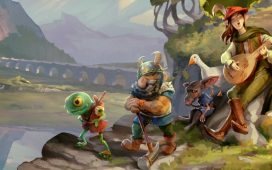After you’ve felled a hard-scaled, fire-breathing dragon in Monster Hunter Rise, you can pose for a photo with your loyal cat and dog (taken by an owl, no less) as its corpse lies in a contorted rictus of agony in the background. Nothing better sums up the Monster Hunter experience than cutesy poses offset against a once-proud giant lizard, broken and humiliated, waiting to be carved up into tomorrow’s armour. That sense of achievement and joviality after brutal and bloody violence is the loop of tension and release that’s kept this series in the charts for 17 years.
Monster Hunter Rise deviates from the uncomfortably colonialist new-world casings of Monster Hunter World and leverages the newfound global popularity of the series to tone things down, take things a bit slower and bring you back to a more rural, communal setting: Kamura Village. But this idyllic slice of sylvan Japanese-inspired life is uneasy; the recurrent calamity of “the Rampage”, an apocalyptic event where the local fauna all turn blood-crazed at once, is in the back of the locals’ minds at all times.
As luck would have it, though, you – a new hunter – have the tenacity and skill to repel this encroaching oblivion of gnashing teeth and rampant claws. Cropping up now and then among the usual range of monster hunts, Rampages come off somewhere between tower defence and chaotic Dynasty Warriors battles, punctuating the narrative and offering the game’s most serious challenge.
Away from these hordes, you’re a hunter. In their midst, you’re prey – and that’s thrilling. Most of the time, you don’t feel like a part of the food chain in Rise. Not like you did in Monster Hunter World, at any rate. This game is a little less empowering: monsters are softer and more forthcoming with their rewards, and they don’t rage and thrash against their inevitable defeat with quite the terrifying vigour that they have in past games.
Monster Hunter has long been the poster child for connectivity and collaboration for Capcom, so it’s no surprise things speed up when you’re playing with other people. The game’s netcode runs seamlessly – even despite the Switch’s historically shonky online play. Drop-in, drop-out play – whether you’re docked or in handheld – happens effortlessly, echoing some of that early magic that made the series so ubiquitous in Japan in the 00s. If you’re playing with friends, you’ll be wearing your dream armour and sharpening your favourite weapons within hours, not days.

It makes sense that the branching weapon techniques of World have been dialled back a little, and everything feels more arcade-y. Special attacks can be swapped out on a whim to make movesets more flexible and comfortable to play. Fourteen weapons, interchangeable skills, ludicrous anime-inspired special attacks that have you leaping around like a particularly flamboyant Power Ranger … it all compresses into a fun, easy-going action game that delights in letting you soften a monster up for 15 minutes before putting it out of its misery with a stylish flourish. It’s perfect for more time-pressed followers of the series, but might leave veterans under-occupied.
But given that you can mount a dog, ride it into battle, then hop on to monsters and turn them against the other yetis, fox-dragons, T rexes or whatever else happens to be within biting range, before zipping off back to your village with the help of a magic bug, it doesn’t seem like Rise should be taken all that seriously. This is a game about relentlessly hunting monsters until you’ve practically pushed a whole ecosystem to the brink of collapse; it’s absurd, it’s theatrical, it’s inane, and it’s fun, a delightfully silly recalibration of a time-tested and powerfully absorbing adventure.














